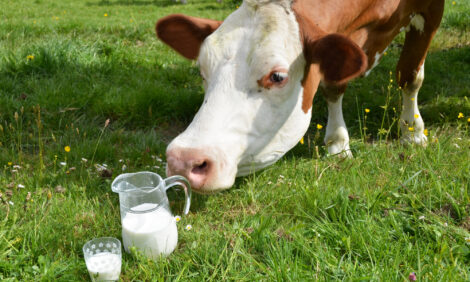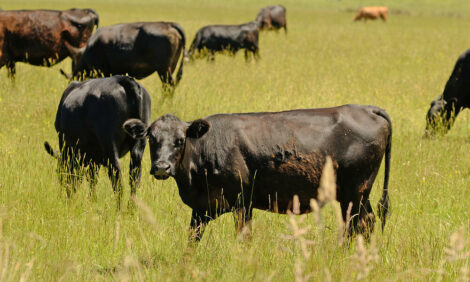



MSD Animal Health introduces “The Science of Prevention” with a record number of abstracts at the 30th World Buiatrics Congress
MSD Animal Health, a division of Merck & Co, today announced a significant number of abstracts (16 oral and 8 poster presentations) to be presented at the World Buiatrics Congress (WBC) in Sapporo, Japan from August 28 – September 1.The research supports the company’s holistic approach to prevention, “The Science of Prevention,” with new data on methods to prevent a broad range of bovine diseases, such as mastitis, bovine respiratory disease, and neonatal diarrhea.
“In today’s day and age, dairy and beef producers face increasing pressure to change the way they operate and proactively prevent disease, not just treat cattle suffering from disease,” said Dr. Jantijn Swinkels, Global Technical Director, Ruminants, MSD Animal Health. “As a trusted partner and a leader in the industry, our role is to introduce veterinarians and producers to a holistic approach to prevention that will help them run an economically healthy farm business with healthy cattle that produces milk and meat according to today’s standards.”
“The Science of Prevention,” a preventative approach to disease across the entire lifecycle, aims to help educate veterinarians and producers on how to implement prevention methods before the animal is born, when it is growing up, and during production in adulthood to effectively improve animal health, wellbeing and productivity. The three pillars of The Science of Prevention are disease avoidance, achieved through good animal husbandry, stress-free housing, vaccination, hygiene and nutrition; prompt diagnosis and treatment, aimed at preventing the spread of disease, disease severity and complications; and the health restoration of affected animals.
MSD Animal Health will host a webinar on August 30 at 9:00 am – 10:30 am (US, Eastern Time) and 3:00 pm – 4:30 pm (Central European Time), where experts will further explain the three levels of prevention – health restoration, prompt diagnosis and treatment, and disease avoidance – and their relevance for cattle and calf health.
During the opening ceremony at WBC 2018, MSD Animal Health will also present the Gustav Rosenberger Memorial Fund to Diego Borin Bobrega, DVM, from Brazil, who won the award for his research on the relationship between the use of antibiotics and antibiotic resistance at the University of Calgary. The Gustav Rosenberger Memorial Fund is an annual grant of €10,000 to a promising young veterinarian.
Select abstracts of interest include:
Abstract #C000333 / UH-18: Effect of dry cow treatment of a teat sealant alone or in combination with antibiotic when applied at the cow or quarter level (Presenter: Dr. Jantijn Swinkels)
In the EU, concern around the prophylactic use of antibiotics has led to scrutiny of dry cow therapy use and the classes of antibiotics used. This study, the first to evaluate dry cow treatment at the quarter level, used different California Mastitis Test (CMT) thresholds at dry off to determine if a quarter level selective dry cow treatment approach may potentially reduce antibiotic use compared to cow level, and in turn, result in more prudent use and better overall dry period outcomes. Our preliminary analysis suggests the most significant benefit of a quarter level approach may be seen in cows defined as ‘uninfected’ at drying off (i.e., low Somatic Cell Counts), where targeting antibiotic use to ‘infected’ quarters was associated with a significant decrease in ‘infected’ quarters at calving. However, to achieve this, more antibiotics were needed. Therefore improved dry period outcomes of quarter level selective dry cow treatment in uninfected cows have to be weighed against the increased antibiotic use.
Abstract #C000342: Retrospective evaluation of clinical outcomes among cattle evaluated with a computer-aided lung auscultation system at the time of bovine respiratory disease diagnosis (Presenter: Dr. Jason Nikkel)
This observational study assessed the value of combining computer-aided lung auscultation (CALA) technology (Whisper® Veterinary Stethoscope) and rectal temperature on multiple clinical outcomes, in aggregate and across weight classes to refine the bovine respiratory disease (BRD) case definition. Results showed that both CALA and rectal temperature classifications were shown to detect differences in the risk of BRD case-fatality. However, the combination allowed further differentiation in the risk of BRD case-fatality and may create additional management opportunities to improve BRD diagnostic accuracy and enhance therapy decisions.
Abstract #C000770: Monitoring synergy between neonatal diarrhea and pneumonia vaccination in heifer’s health and growth until weaning (Presenter: Dr. Laura Elvira)
Neonatal diseases have a short-term effect such as mortality, as well as long-term negative effects such as reduction in calf growth rate or decrease in future milk productivity. This study evaluated, for the first time, the synergistic effect of vaccinating dams with a scours vaccine together with a pneumonia vaccine on calf morbidity and mortality, not only due to scour, but also due to early pneumonia affecting calves before weaning. None of the calves born from vaccinated dams had early pneumonia during the first month of life, while 27 percent of the control group (not vaccinated) presented early lung lesions. In addition, calves from unvaccinated dams had 2.72 higher risk for neonatal diarrhea compared to vaccinated calves. These results demonstrate the complementary effect of the use of an inactivated multivalent vaccine against neonatal calf diarrhoea in the dams and an inactivated multivalent respiratory vaccine in the young calves, reducing the morbidity of both neonatal diarrhoea and pneumonia.
For additional information on MSD Animal Health research from congress speakers and authors, visit Studio Bovine. For more information about WBC 2018, visit www.wbc2018.com. For additional information and a visual depiction of the holistic approach to disease prevention, visit the MSD Animal Health Exhibit Booth (#M6 in Hall B).
About MSD Animal Health
For more than a century, MSD, a leading global biopharmaceutical company, has been inventing for life, bringing forward medicines and vaccines for many of the world’s most challenging diseases. MSD Animal Health, a division of Merck & Co., Inc., Kenilworth, N.J., USA, is the global animal health business unit of MSD. Through its commitment to the Science of Healthier Animals™, MSD Animal Health offers veterinarians, farmers, pet owners and governments one of the widest range of veterinary pharmaceuticals, vaccines and health management solutions and services. MSD Animal Health is dedicated to preserving and improving the health, well-being and performance of animals. It invests extensively in dynamic and comprehensive R&D resources and a modern, global supply chain. MSD Animal Health is present in more than 50 countries, while its products are available in some 150 markets. For more information, visit www.msd-animal-health.com or connect with us on LinkedIn and Twitter.
| ThePigSite News Desk | More Merck/MSD Animal Health News |



